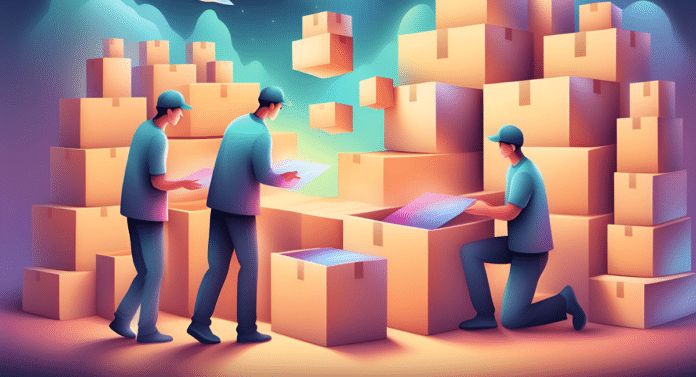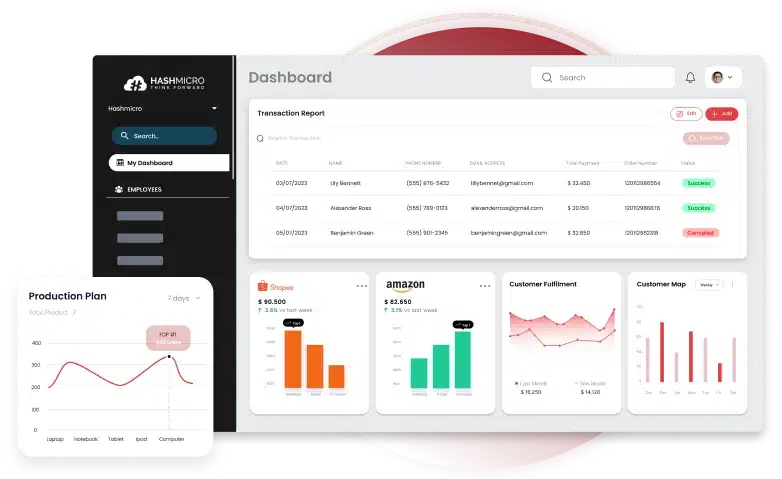In every business process, distributors facilitate the exchange of products and money between producers and consumers. Acting as a bridge, distributors play a crucial role in connecting these two parties effectively.
To excel as intermediaries, distributors must perform specific tasks to achieve their primary objectives. Utilizing a comprehensive supply chain management (SCM) system can assist in simplifying these tasks and enhancing efficiency.
Successful distribution requires strategic planning and the support of an integrated SCM system. The market significantly influences distributors, impacting sales and necessitating adaptive strategies.
An effective SCM System enables distributors to streamline operations, optimize inventory, and adapt to market shifts with ease. By enhancing visibility and improving coordination, it ensures efficient decision-making and a more responsive supply chain.
Key Takeaways
|
Table of Content:
Table of Content

What is a Distributor?
Simply put, a distributor buys products directly from manufacturers and then sells them to stores or customers. They manage distribution channels to get products to buyers quickly, making it easier for everyone to access goods without hassle.
Distributors play a crucial role in helping retail stores keep shelves stocked. They’re the bridge between manufacturers and retailers, ensuring popular products are always ready and available. When distributors buy in bulk, they enjoy better prices, which means higher profits and competitive deals for customers.
Most retail stores rely on distributors rather than buying directly from manufacturers. Only big businesses selling special items, such as cars or luxury goods, usually purchase straight from the producer. Luxury or speciality products often need direct deals to ensure quality and exclusivity.
What is a Wholesaler?
A wholesaler is a business entity or individual who buys goods in large quantities directly from manufacturers or major distributors and resells them to retailers, businesses, or other wholesalers.
Wholesalers play an important role in the supply chain, providing effective product distribution and allowing retailers to access inventories and offer competitive pricing. Unlike retailers, wholesalers do not sell directly to customers. Their main focus is on bulk transactions, inventory management, and logistics.
Though they normally do not engage in marketing or customer service, their capacity to sell products in huge quantities at low cost makes them an important part of the commercial distribution network.
The Roles of Distributor
When carrying out distribution activities, distributors have roles and functions. The main role and function of the distributor are, of course, as an intermediary between producers and retailers or consumers. Check out a further description of its roles as follows:
1. Buying products from manufacturers
The job of a dealer is to buy products (goods or services) from larger producers or traders.
2. Store products properly
After the dealer buys goods from the manufacturer, the distributor is responsible for storing and maintaining the product to remain of high quality. For example, when you become a distributor of computer equipment, you should have a clean storage warehouse and goods stored in packaging that keeps the products inside.
The warehouse management system will help you optimize the use of your warehouse space by automatically calculating and tracking capacity.
3. Selling products at competitive prices
Indeed, distributors benefit from margins on product purchases from manufacturers. Even so, this stage is your competition with other distributors. You as much as possible to keep a profit but must maintain a competitive selling price.
That way, you can get maximum profit and remain the choice for prospective buyers, whether retail businesses or end consumers.
4. Transporting products
Distributors also move or transport products from producers to retail companies or consumers. After the goods stored in the warehouse have to go out and the buyer schedules delivery, you, as the distributor, are responsible for the products sold to make delivery.
Even so, there is a certain agreement concept when making deliveries—usually related to the costs required to later enter into accounting records. Through the agreement, the seller or the buyer can bear the transportation costs.
Also Read: How to Optimize the Transport Management in Your Logistics Business
5. Doing product classification or sorting
The dealer is responsible for sorting the product. Sorting is important because a product usually has its classification. Sorting products depends on their size, type, and quality so that they are not mixed.
6. Provide product information
This means that the distributor provides information about the estimated price and marketing of goods at a certain time that the field implementer will carry out.
7. Promote products attractively
This promotional activity includes explaining product benefits, product quality, and price. Your product can be promoted through marketing channels. The promotion aims to introduce the product to consumers.
In developing a retail business, you can use the Hash Retail Innovation software to maintain stock availability, increase employee productivity and customer management, and automate your company’s financial transactions.
The Function of a Distributor in Business Success
In today’s competitive market, distributors are crucial in bridging the gap between manufacturers and end-users. Acting as intermediaries, they ensure that products are efficiently transported from production facilities to retailers, wholesalers, or even directly to customers. This function streamlines supply chains and adds value to businesses by ensuring timely delivery and market reach.
- Inventory Management: Distributors maintain stock levels to meet market demand, ensuring product availability while reducing delays.
- Logistics and Delivery: They handle transportation, warehousing, and delivery to ensure smooth product flow from manufacturers to retailers or consumers.
- Market Expansion: Distributors help manufacturers penetrate new markets and grow their reach by promoting products and building relationships with retailers.
- Credit and Financing: Distributors often provide retailers with credit, helping smaller businesses maintain cash flow while purchasing inventory.
- After-Sales Support: Some distributors offer customer service, technical assistance, and warranty management, enhancing customer satisfaction and loyalty.
- Market Intelligence: Distributors gather insights about customer preferences, market trends, and competition, which manufacturers can use to refine strategies.
In essence, distributors are crucial intermediaries who ensure that products are delivered efficiently, market demands are met, and manufacturers can focus on production while distributors handle the complexities of distribution.
The Benefits of Being a Distributor
Being a distributor offers significant benefits, especially when it comes to managing and distributing products on a large scale. Wholesale distribution software can help distributors optimize their operations, from inventory management to product delivery.
Here are some of the potential benefits that can be derived from being a distributor:
1. No need for many diversified customers
Being a distributor means you don’t have to worry about most of the companies you supply. The focus for distributors is the quality of contracts with your clients, namely retail companies.
In contrast to retail companies, without many diversified customers, retail companies cannot grow or survive. Competitors in retail companies will certainly try to attract the same consumers as your retail company segment. So, you have to work harder to compete with your competitors.
2. No need to worry about some of the companies that supplied
The main focus for distributors is the quality of contracts with your clients, namely retail companies. This still alludes to the first point. You don’t need to put in much more effort to get many different/diversified customers.
If the supplier successfully secures a contract to supply to a large retail company, the distributor may not need another contract to keep the business growing and survive.
3. It’s easier to build relationships with clients
Manufacturers and retailers tend to choose distributors they already know and have good working relationships with before looking for new distributors.
Your focus as a distributor is to build good relationships with your clients. The result is that your income as a supplier will be more consistent, and you won’t have to market your distribution business to attract new clients aggressively.
BONUS TIP: Using a loyalty program will help build good relationships with your clients. Use Sales Management Software from HashMicro for smarter, faster, and more effective sales solutions.
Wholesale and distribution are critical supply chain components yet serve distinct purposes. Wholesalers focus on purchasing goods in bulk directly from manufacturers and reselling them to retailers or smaller distributors.
| Aspect | Wholesalers | Distributors |
|---|---|---|
| Main Role | Buy bulk goods from manufacturers and sell them to retailers or smaller distributors. | Connect manufacturers directly with retailers or final consumers. |
| Core Focus | Economies of scale, low pricing, streamlined bulk supply. | Value-added services, marketing, logistics, and after-sales support. |
| Operational Style | Operate from large warehouses with minimal extra services. | Provide customized solutions, building long-term customer relationships. |
| Customer Interaction | Limited focus on customer service, emphasizing product supply. | Actively engage customers, ensuring product accessibility and market penetration. |
| Ideal For | Businesses prioritise high volume and lower profit margins. | Businesses aiming for deeper market reach and tailored services. |
Key Strategy to Become a Successful Distributor
A successful distributor ensures seamless operations, optimized resources, and a customer-centric approach to stay ahead in the game. To achieve this, distributors must focus on understanding market trends, adopting efficient inventory management practices, and building a dependable supply chain.
Embracing technology and maintaining financial discipline are equally important to thrive in this fast-paced industry. With the right strategies, you can improve operations, enhance profitability, and secure long-term growth. Here are some of the key strategies that can help you excel as a distributor.
1. Expanding the distributor chain
It is indisputable that the distributors’ role in the business world is very important. Therefore, you need to build as many distributor chains as possible to reach a wider market. This will help rotate goods and market products quickly.
2. Creating repeat orders through competitive prices
Most people will certainly choose a relatively affordable product that provides benefits & value. The price factor of a product is one of the keys to repeat orders.
Big profits are tempting, but the key to your business’s survival is to keep customers from transacting with you over the long term.
3. Speed up product turnover
The usual obstacle that companies experience is product turnover. Usually, the product is difficult to get out and causes the goods in the warehouse to pile up.
You can use certain strategies to speed products in and out. Offer cooperation offers with other parties, for example, opening a dropship system or an affiliate system.
4. Have good negotiation skills
As a distributor, having good soft skills in negotiating with manufacturers is very important. Because your ability to negotiate will be directly related to business profits, the more you manage to lower the price in the contract, the more you can profit.
Negotiation certainly has many strategies of its own. While negotiation theory is easy to find, you need experience and a good intuition in practice.
5. Optimize logistics management
In a distributor’s role, one is transporting and delivering the product to the client. The role of delivering the product to this client is to run the distribution.
You can use the Best Transportation Software from HashMicro for product transportation to run smoothly. This system allows you to manage distribution by simplifying transportation, delivery of goods, and revenue analysis quickly and accurately. Switch to HashMicro, now.
6. Good key account management skills
Key Account Management is an effort to build good and sustainable relationships with clients. These skills that you should use are very useful for maintaining and enhancing your reputation with clients.
According to the Pareto Principles, about 80% of its revenue comes from 20% of its customers. So, it is important to segment clients to find Key Account Management.
7. Carry out effective and efficient marketing strategies
Are you familiar with the concept of FOMO? FOMO stands for Fear of Missing Out. The FOMO strategy creates an urgency for the client to buy the product at a certain time and is being used by many companies as an effective marketing strategy.
There are many marketing strategies that you can apply, and you can apply them if they suit your business needs.
The FOMO strategy can be applied by putting up promos for a certain period. For example, when you are distributing wooden tables, by implementing the FOMO strategy, you tell the client that if you buy a total of 12 tables, then you are entitled to free logistics delivery for the next two days.
Manage Your Distribution Business Using ERP Software from HashMicro
Enhance your distribution business with HashMicro’s Logistics Software, designed to optimize operations and improve efficiency across your supply chain. From real-time inventory management to seamless order tracking, our solution empowers you to stay competitive in a dynamic market.
HashMicro’s software also includes advanced analytics and reporting features, enabling you to make data-driven decisions that enhance profitability. From optimizing stock levels to ensuring timely deliveries, HashMicro’s system helps you meet customer demands effectively while controlling costs. Moreover, the system is fully customizable, ensuring it adapts to the unique needs of your distribution business.
Conclusion
Distributors connect manufacturers and consumers by ensuring efficient product flow, market reach, and customer satisfaction. By mastering these functions, distributors can position themselves as indispensable partners in the supply chain.
Adopting effective strategies is essential to thriving in the competitive distribution industry. Expanding distribution networks, maintaining competitive pricing, and optimizing logistics are crucial steps toward success. Consider using wholesale distribution software to meet all your distribution needs.
Leveraging technology, such as ERP and logistics management software, can further enhance operational efficiency, ensuring seamless distribution, real-time tracking, and accurate reporting. These tools empower distributors to adapt quickly to market changes, streamline workflows, and maintain strong client relationships.
With HashMicro’s logistics software, distributors can elevate their operations, optimize resources, and stay ahead in a dynamic market. Take the next step in transforming your distribution business—request a free demo today to experience the benefits firsthand.
FAQ about Distributor
What is the definition of a distributor?
A distributor buys products in bulk from manufacturers and sells them to retailers or businesses. They manage storage, logistics, and transportation to ensure products reach various markets efficiently, acting as a vital link in the supply chain.
What is a distributor vs retailer?
A distributor buys goods in bulk from manufacturers and sells them to retailers or businesses (B2B). A retailer sells products directly to consumers (B2C), typically in smaller quantities, often focusing on marketing, customer service, and sales.
What do you mean by distribution?
Distribution is the process of getting products from manufacturers to consumers. It involves intermediaries like distributors and retailers, alongside logistics, storage, and transportation, ensuring that products are available at the right place and time for the end user.




































